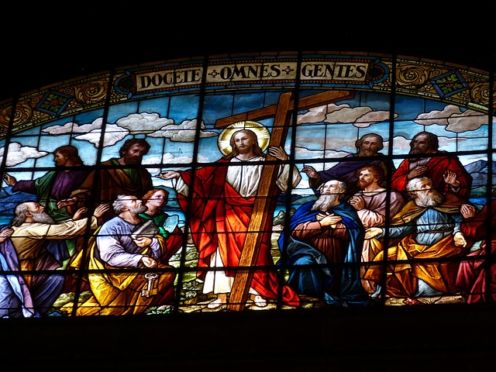Fr. Michael Schleupner shared the homily below last week and we think our readers will also enjoy his insights. How does it shed light on this passage from Luke for you?
And he lifted up his eyes on his disciples, and said: “Blessed are you poor, for yours is the kingdom of God. Blessed are you that hunger now, for you shall be satisfied. Blessed are you that weep now, for you shall laugh. Blessed are you when men hate you, and when they exclude you and revile you, and cast out your name as evil, on account of the Son of man! Rejoice in that day, and leap for joy, for behold, your reward is great in heaven; for so their fathers did to the prophets. But woe to you that are rich, for you have received your consolation. Woe to you that are full now, for you shall hunger. Woe to you that laugh now, for you shall mourn and weep. Woe to you, when all men speak well of you, for so their fathers did to the false prophets.” ~Luke 6:20-26
“Blessed” or “Woe” 
I drive a Subaru Outback and I have an HD TV. I have an iPhone and an Apple MacBook.
Jesus says: “Blessed are you who are poor,” and “Woe to you who are rich.” So, am I on the blessed side or the woe side?
I really enjoy crab cakes and an occasional prime rib. I like all kinds of pasta and pizza.
Jesus says: “Blessed are you who are hungry,” and “Woe to you who are filled now.” So again, am I on the blessed side or the woe side?
I enjoy joking around with others. I sometimes watch comedy movies on Netflix.
Jesus says: “Blessed are you who are weeping,” and “Woe to you who laugh now.” So, am I on the blessed side or the woe side?
And, I like to be liked. I like being well thought of and appreciated.
Jesus says: “Blessed are you when people hate you,” and “Woe to you when all speak well of you.” So again, am I on the blessed side or the woe side?
The Key: The Poor
Well, I have done some reading and dug into this gospel a bit, and here is my take on it. The key to all that Jesus says is the very first statement: “Blessed are you who are poor.” On one level, Jesus is standing with those who are financially poor. But on another level, he is really speaking to those who know that they are personally or spiritually poor. He is speaking to anyone who knows that there is a personal or spiritual emptiness within them.
Jesus knows that those who are materially poor are often quickly aware of their personal emptiness or poverty. Because of that, they may more readily turn to God and trust in God.
But Jesus is calling all of us – regardless of how much we own – to become aware of our inner emptiness or poverty. And he is saying that if we are aware of this, we are much more likely to be centered on God and relying on God.
The Rest Follows
The rest of Jesus’ statements of who is blessed or happy in God’s eyes flow from what I have just said. So, if we know that we are spiritually poor, we will be hungry for God. We will make room for God in our lives. We will make time for Mass and for some personal prayer and for some enriching reading. This will fill the emptiness and satisfy the hunger in our spirit.
If we know that we are spiritually poor, we will weep. We will notice the parts of our culture and of our selves where God is not present. We will care for those who literally are hungry or are subjected to any kind of prejudice or oppression. We will weep for these situations and for our own personal deficiencies.
And, if we know that we are spiritually poor, we will be less concerned with what others think of us. We will more concerned about being at peace with God and with others. We will be more alert to being truthful and honest. Integrity and authenticity will be our dominant concerns.
“Blessed” or “Woe”?
So, am I or are we more on the blessed side or the woe side? Maybe this is not easy to answer. Maybe it is more of an ongoing process. Maybe each day we need to own up to being poor – that there is an emptiness and something lacking in us. And when we can own up to that, we can then be hungry for God, and weeping for where God is not present in the world and in me, and caring for how God sees me and not how others see me.
Let’s allow the Eucharist each week to help us with this. Let’s allow Jesus in this sacrament to transform us little by little into the kind of person he calls blessed.
~Fr. Michael Schleupner
